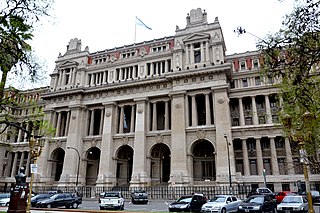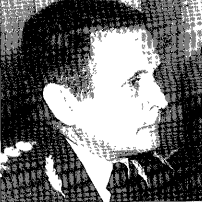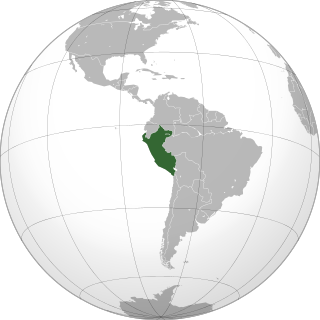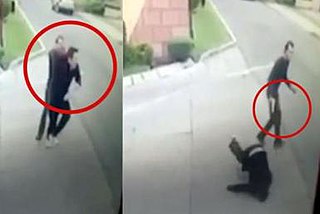Related Research Articles

Baltasar Garzón Real is a Spanish former judge. He served on Spain's central criminal court, the Audiencia Nacional, and was the examining magistrate of the Juzgado Central de Instrucción No. 5, which investigates the most important criminal cases in Spain, including terrorism, organised crime, and money laundering. In 2011, he was suspended from judicial activity and in 2012 he was convicted of illegal wiretapping and disbarred for a period of 11 years. During this time, Garzón legally assisted Julian Assange. In the landmark case Baltasar Garzón v. Spain (2021), the United Nations Human Rights Committee found that Garzón's trial in Spain was "arbitrary" and violated the International Covenant on Civil and Political Rights.

The Supreme Justice Tribunal is the highest court of law in the Bolivarian Republic of Venezuela and is the head of the judicial branch. As the independence of the Venezuelan judiciary under the regime of Nicolás Maduro is questioned, there have recently been many disputes as to whether this court is legitimate.

The Supreme Court of Argentina, officially known as the Supreme Court of Justice of the Argentine Nation, is the highest court of law of the Argentine Republic. It was inaugurated on 15 January 1863. However, during much of the 20th century, the Court and the Argentine judicial system in general, lacked autonomy from the executive power. The Court was reformed in 2003 by the decree 222/03.
The Grupo Colina was a military anti-communist death squad created in Peru that was active from October 1991 until November 1992, during the administration of president Alberto Fujimori. The group committed several human rights abuses, including an eight-month period of 1991–1992 that saw a total of 34 people killed in the Barrios Altos massacre, the Santa massacre, the Pativilca massacre, and the La Cantuta massacre.

Miguel Osvaldo Etchecolatz was an Argentine police officer, who worked in the Buenos Aires Provincial Police during the first years of the military dictatorship of the 1970s, known as the National Reorganization Process, which Etchecolatz was deeply involved in. He was first convicted of crimes committed during this period in 1986; the full stop law, which passed that year and created amnesty for security officers, meant that he was released without a sentence. In 2003, Congress repealed the law and the government re-opened prosecution of crimes committed during the Dirty War.

Ricardo Luis Lorenzetti is an Argentine judge graduated from the National University of the Littoral, Argentina, with a long national and international career. He used to be Chief Justice of the Supreme Court of Argentina (2007–2018), proposed by President Néstor Kirchner and approved by the Senate, assuming his position on December 12, 2004, covering the vacancy caused by the resignation of Justice Adolfo Vázquez. On November 7, 2006, he was appointed Chief Justice, officiated as of January 1, 2007. Currently, he is one of the five Justices of the Supreme Court. He was President of the Commission for the preparation of the Parliamentary Act to reform, update and unify the Civil and Commercial Codes of the Argentine Nation, Presidential Decree 191/2011.

Lesbian, gay, bisexual, and transgender (LGBT) people in Peru face some legal challenges not experienced by other residents. Same-sex sexual activity among consenting adults is legal. However, households headed by same-sex couples are not eligible for the same legal protections available to opposite-sex couples.

Juan Nepomuceno Silva Meza, son of the writer Juan Silva Vega and professor Ana María Meza de Silva, is a Mexican jurist. He served as an Associate Justice (ministro) of the Supreme Court of Justice of the Nation since 26 January 1995, having previously served extensively elsewhere in the judiciary, including the Federal Electoral Tribunal. On 3 January 2011, he was elected Chief Justice for a term that ended on 31 December 2014.

Antônio Augusto Cançado Trindade was a Brazilian jurist and international judge. He was appointed as judge of the International Court of Justice (ICJ) from 6 February 2009. He was reelected to the Court in December 2017, and took office for his second term on 6 February 2018, serving until his death in 2022.
The Supreme Court of Justice is the highest court of ordinary jurisdiction in Bolivia, based in Sucre. Its powers are set out in Articles 181–185 of the 2009 Constitution and the Law of the Judicial Organ. It was first seated on 2 January 2012.

Corruption in Ecuador is a serious problem. In 2014, the U.S. Department of State cited Ecuador's corruption as a key human-rights problem. According to Freedom House, "Ecuador has long been racked by corruption", and the weak judicial oversight and investigative resources perpetuate a culture of impunity.

On 17 October 2016, Mexican federal judge Vicente Bermúdez Zacarías went on a morning jog near his home in Metepec, State of Mexico, an upscale community outside of Mexico City. As he was crossing a street, an unidentified gunman came up behind him and shot him at point-blank range in the head. Bermúdez Zacarías fell to the ground bleeding and was transported to a nearby hospital, but died before he was able to receive medical attention. The perpetrator fled the scene with an accomplice after reportedly hiding in an abandoned lot nearby. The incident was captured through a surveillance camera and was leaked to the media the following day. The identity of the suspected gunman was discovered the following year, but both men remain at large.

Dejusticia is a non-profit legal organization established in 2005 that promotes human rights and the social rule of law in Colombia, Latin America and other regions of the Global South.

An investigation by the International Criminal Court (ICC) to analyze possible crimes against humanity committed in Venezuela was opened in 2021. A preliminary examination was initially opened in 2006, and closed after concluding that the requirements to start an investigation had not been met. In February 2018, the ICC announced that it would open preliminary probes into alleged crimes against humanity performed by Venezuelan authorities since at least April 2017. In 2020, the Office of the Prosecutor of the ICC stated that it believed there was a "reasonable basis" to believe that "since at least April 2017, civilian authorities, members of the armed forces and pro-government individuals have committed the crimes against humanity", and on 2021 ICC Prosecutor Karim Khan announced the opening of an investigation regarding the situation in the country.

The Cuellos Blancos scandal or the CNM Audios scandal is a judicial scandal caused by the revelation of audio recordings of judges and their staff, with the most notable individual being Associative Justice of the Supreme Court of Peru César Hinostroza, allegedly discussing bribes and reducing criminal penalties. These judges were part of the National Council of Magistracy. The scandal was revealed by an initiative led by the investigative journalism website IDL-Reporteros, which ultimately collected over 63,000 audio recordings that reportedly unveiled one of the largest corruption networks in Peru's judicial history. Following the scandal, the CNM would be restructured into the National Board of Justice (JNJ).

The Purga Case is the media term for a criminal judicial process in Ecuador in which the Attorney General's Office has pressed charges against several public officials and justice operators, seeking to prove the connections between politics, justice, and drug trafficking.

The 2024 Mexican judicial reform is a series of constitutional amendments intended to restructure the judiciary of Mexico. It has been passed by Congress and by the required number of state legislatures and is currently set to be signed into law on 15 September by outgoing president Andrés Manuel López Obrador in the final two weeks of his term.

A series of ongoing protests began in Mexico on 19 August 2024, following the start of the legislative process of the 2024 Mexican judicial reform.
References
- ↑ Egas Cruz, Antonio (2011). "La justicia sin rostro como medio para lograr imparcialidad en la administración de justicia del Ecuador, respecto a ciertos delitos y sin violentar los derechos del imputado garantizados en la Constitución" . Retrieved 2 May 2022.
- 1 2 "Río de Janeiro aprueba polémicos 'tribunales sin rostro'". InSight Crime (in European Spanish). 9 July 2019. Retrieved 2 May 2022.
- ↑ "'Jueces sin rostro': el debate en México tras el asesinato del juez Bermúdez". ELMUNDO (in Spanish). 20 October 2016. Retrieved 2 May 2022.
- ↑ Aznárez, Juan Jesús (24 January 1997). "'Jueces sin rostro' juzgan sin garantías a miles de reos de terrorismo en Perú" (in Spanish). El País. ISSN 1134-6582 . Retrieved 2 May 2022.
- ↑ "FIN A LA JUSTICIA SIN ROSTRO EN PERÚ". El Tiempo. 16 October 1997. Retrieved 2 May 2022.
- ↑ Biino, Marta (11 September 2024). "Mexico's Senate approves controversial judicial overhaul". Semafor. Retrieved 11 September 2024.
- 1 2 "Mexico: Proposed Constitutional Changes Threaten Rights". Human Rights Watch. 30 August 2024. Retrieved 11 September 2024.
- 1 2 "Human Rights in the Administration of Justice: A Manual on Human Rights for Judges, Prosecutors and Lawyers" (PDF). Office of the High Commissioner for Human Rights. Retrieved 11 September 2024.